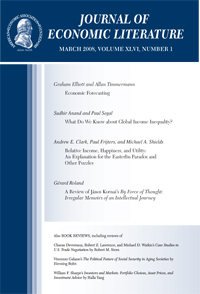Mass Atrocities and Their Prevention
IF 10.6
1区 经济学
Q1 ECONOMICS
引用次数: 12
Abstract
Counting conservatively, data show about 100 million mass atrocity-related deaths since 1900. A distinct empirical phenomenon, mass atrocities are events of enormous scale, severity, and brutality, occur in wartime and in peacetime, are geographically widespread, occur with surprising frequency, under various systems of governance, and can be long-lasting in their effects on economic and human development, wellbeing, and wealth, more so when nonfatal physical injuries and mental trauma also are considered. As such, mass atrocities are a major economic concern. Given the multidisciplinary nature of the subject matter, the pertinent conceptual, theoretical, and empirical literatures are voluminous and widely dispersed, and have not been synthesized before from an economics point of view. We address two gaps: a “mass atrocities gap” in the economics literature and an “economics gap” in mass atrocities scholarship. Our goals are, first, to survey and synthesize for economists a broad sweep of literatures on which to base further work in this field and, second, for both economists and noneconomists to learn how economic inquiry contributes to understanding the causes and conduct of mass atrocities and, possibly, to their mitigation and prevention. In drawing on standard, behavioral, identity, social network, and complex systems economics, we find that the big puzzles of the “how” and “why” of mass atrocities, and mass participation therein, are being well addressed. While new research on such topics will be valuable, work should also progress to develop improved prevention approaches. (JEL D72, D74, K38, N40, Z13)大规模暴行及其预防
保守计算,数据显示,自1900年以来,约有1亿人死于大规模暴行。大规模暴行是一种独特的经验现象,它是大规模、严重和残暴的事件,发生在战争和和平时期,在地理上分布广泛,在各种治理体系下发生的频率惊人,对经济和人类发展、福祉和财富的影响可能是持久的,当非致命性的身体伤害和精神创伤也被考虑在内时,情况更是如此。因此,大规模暴行是一个主要的经济问题。鉴于主题的多学科性质,相关的概念、理论和实证文献数量庞大,分布广泛,以前从未从经济学的角度进行过综合。我们解决了两个缺口:经济学文献中的“大规模暴行缺口”和大规模暴行学术中的“经济学缺口”。我们的目标是,首先,为经济学家调查和综合广泛的文献,以便在这一领域开展进一步的工作;其次,为经济学家和非经济学家了解经济调查如何有助于理解大规模暴行的原因和行为,并可能有助于减轻和预防暴行。在借鉴标准经济学、行为经济学、身份经济学、社会网络经济学和复杂系统经济学的过程中,我们发现大规模暴行的“如何”和“为什么”以及大规模参与其中的巨大困惑正在得到很好的解决。虽然对这些主题进行新的研究将是有价值的,但在制定改进的预防方法方面也应取得进展。(JEL D72、D74、K38、N40、Z13)
本文章由计算机程序翻译,如有差异,请以英文原文为准。
求助全文
约1分钟内获得全文
求助全文
来源期刊

Journal of Economic Literature
ECONOMICS-
CiteScore
17.80
自引率
0.80%
发文量
49
期刊介绍:
Commencing in 1969, the Journal of Economic Literature (JEL) serves as a vital resource for economists, offering a means to stay informed about the extensive literature in the field. Each JEL issue features commissioned, peer-reviewed survey and review articles, book reviews, an annotated bibliography categorizing new books by subject, and an annual index of dissertations from North American universities.
 求助内容:
求助内容: 应助结果提醒方式:
应助结果提醒方式:


